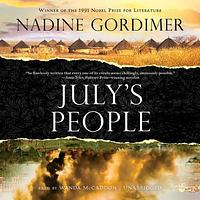Take a photo of a barcode or cover
dark
emotional
reflective
fast-paced
Plot or Character Driven:
Character
Strong character development:
No
Loveable characters:
No
Diverse cast of characters:
Yes
Flaws of characters a main focus:
Yes
I liked how detailed the writing was. This book definitely made me think. However, the reading experience was not the best for me, and I was periodically very confused.
It's an interesting proposal for what the ending of Apartheid could have looked like.
Civil War leads to the upheaval of the country and a white family is forced to flee, seeking shelter with their servant (now savior). It's a juxtaposition of white and black life in South Africa.
The book starts off with disjointed prose, odd jumps in time and lacks solid character introductions, exacerbated by en dashes to separate thought from spoken words, changes in speaker, or just changes in topic. It's a challenging style, but you get used to it eventually. Luckily, the non-demarcated jumps in time diminish as you progress through the novel.
The book is full of powerful imagery and does an excellent job of portraying the disconnect between "Weren't we kind and caring bosses/masters." vs "I was a barely paid servant forced to live in segregation and isolation only seeing my family every 2 years." It's not an easy gap to bridge.
Civil War leads to the upheaval of the country and a white family is forced to flee, seeking shelter with their servant (now savior). It's a juxtaposition of white and black life in South Africa.
The book starts off with disjointed prose, odd jumps in time and lacks solid character introductions, exacerbated by en dashes to separate thought from spoken words, changes in speaker, or just changes in topic. It's a challenging style, but you get used to it eventually. Luckily, the non-demarcated jumps in time diminish as you progress through the novel.
The book is full of powerful imagery and does an excellent job of portraying the disconnect between "Weren't we kind and caring bosses/masters." vs "I was a barely paid servant forced to live in segregation and isolation only seeing my family every 2 years." It's not an easy gap to bridge.
Not an easy book to read, because it was natural for me to identify with Maureen, a woman who — with her husband and their three children — is rescued from a violent revolution by the family's black servant of 15 years. July, the now-former servant, shelters them in his village, some hours distant from their suburban home. The family is entirely dependent on July, and the role reversal raises so many issues not only about apartheid in South Africa but about race relations and class relations everywhere.
I was less unsettled during the second half of this very short novel than I was while reading the first half. That was probably because Maureen and her children have somewhat adapted to their new situation by then. Her husband, however, is so much a fish out of water, he just doesn't know how to feel. He does useful things, like hunt and fish and build a water retention system for the village, but he's constantly on edge. Maureen tries to integrate herself with the women in the village, but it's clear they don't want her. They tolerate her only because July has brought her and her family, but they don't want to accept her. She will always be an alien to them.
I would recommend this book to just about anyone, anywhere, but expect to be challenged by the story and to feel conflicting emotions while reading.
I was less unsettled during the second half of this very short novel than I was while reading the first half. That was probably because Maureen and her children have somewhat adapted to their new situation by then. Her husband, however, is so much a fish out of water, he just doesn't know how to feel. He does useful things, like hunt and fish and build a water retention system for the village, but he's constantly on edge. Maureen tries to integrate herself with the women in the village, but it's clear they don't want her. They tolerate her only because July has brought her and her family, but they don't want to accept her. She will always be an alien to them.
I would recommend this book to just about anyone, anywhere, but expect to be challenged by the story and to feel conflicting emotions while reading.
Mijn tweede van Nadine Gordimer. The Conservationist, een roman die ik uit de kast van mijn ouders had gejat en zonder al te veel verwachtingen was gaan lezen, sloeg in als een bom: een impliciete, broeierige verteltrant waar het Engelse woord ‘dense’ voor lijkt te zijn uitgevonden en waarin Gordimer gelijkenis vertoont met haar landgenoot Coetzee; en de enorme emotionele intensiteit die daar het gevolg van is… ik vind het prachtig. ‘High emotional voltage’ noemt een van de recensenten achter op mijn tweede Gordimer, “
July’s People het treffend, en ook deze roman is een voltreffer. Er zijn in mijn leven maar weinig auteurs geweest van wie ik alles of toch op zijn minst veel wil lezen: Auster, Kafka, Proust, Woolf, Coetzee, DeLillo, Johnson — daar heeft Gordimer zich nu bij gevoegd.
July’s People het treffend, en ook deze roman is een voltreffer. Er zijn in mijn leven maar weinig auteurs geweest van wie ik alles of toch op zijn minst veel wil lezen: Auster, Kafka, Proust, Woolf, Coetzee, DeLillo, Johnson — daar heeft Gordimer zich nu bij gevoegd.
Displacement is an horrific experience, and this short novel covers it like only a handful have.
A compact gem that says so much in so few pages. First published in 1981, it is still relevant in its portrayal of relations between races, the threat of race war, and the precariousness and duplicitousness of being a “liberal” in a changing society.
Beautifully written prose. The descriptions of life in July's settlement are vivid - often achieved through precise word-sketches in just a few sentences, yet so evocative.
The book subtly reveals power struggles in apartheid South Africa; power struggles between black and white (no matter how liberal their thinking), between man and woman, city and village - nation against nation... struggles that are still apparent in the micro cosmos of the village we get to know so intimately in the course of the book.
The book subtly reveals power struggles in apartheid South Africa; power struggles between black and white (no matter how liberal their thinking), between man and woman, city and village - nation against nation... struggles that are still apparent in the micro cosmos of the village we get to know so intimately in the course of the book.
Probably the white South African author who comes the closest to getting it. Plays out as a George Eliot-esque novel as experiment in which, rather than Silas Marner's eventual fulfillment at Raveloe, the central family of rejected white liberals find distasteful poverty, repeated failures to cash in the dead power of their old lives for power in their new ones, loss of status, and eventually menacing helicopters on the horizon. An honest look both at Gordimer's own class and the reasons why the people they oppressed did not revolt against them.
Should try again, but I didn't get into it fast enough
Book #7 of 45 for 45 published in 1981
This book is artful and influential, but for some reason I couldn’t get into it.
This book is artful and influential, but for some reason I couldn’t get into it.






